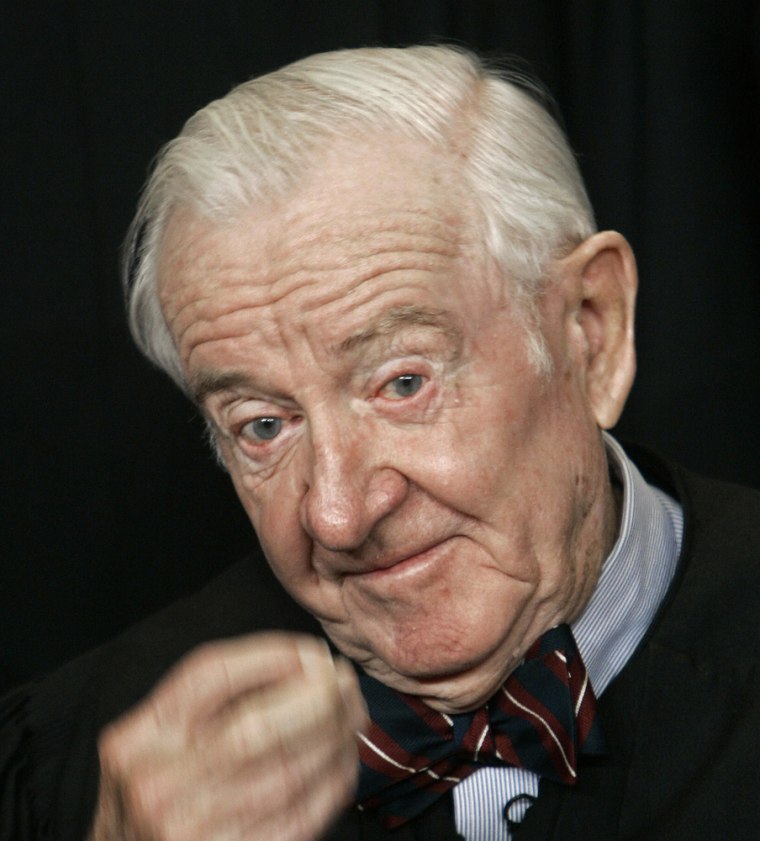The Supreme Court’s decision Monday upholding Indiana’s voter photo identification law was another timely reminder, if any were needed, of how big the stakes are in November’s election.
The next president is likely to have the chance to nominate at least one justice.
The author of Monday’s decision, Justice John Paul Stevens, age 88, will almost certainly retire in the next few years.
The next oldest justice, 75-year-old Ruth Bader Ginsburg, appointed by President Clinton, dissented from Monday’s ruling.
Democrats are concerned that the Indiana voter identification law — and ones like it in other states — will make it harder for them to get the votes they need to elect the next president.
“These (voter photo ID) laws are no more than a cynical attempt to suppress turnout among groups who tend to vote for candidates who prioritize working families' issues, including lower income Americans and people of color,” said AFL-CIO president John Sweeney, a member of the Democratic National Committee.
Looking for 'a new Supreme Court'
Asked Tuesday whether he could think of a practical step the Democratic Congress could take to offset the high court ruling, Senate Democratic Whip Dick Durbin, D- Ill., joked, “A new Supreme Court!”
That won’t be possible just yet.
What made Monday’s ruling an even more bitter pill for Democrats to swallow was that it was written by Stevens, usually a member of the court's liberal wing.
Many Democrats had considered Stevens a hero, partly for his opposition to the death penalty and partly for his unusually harsh dissenting opinion in the court’s 5-4 Bush v. Gore decision, which essentially handed the 2000 election to President Bush.
"I was very deeply disappointed with Justice Stevens," said Sen. Charles Schumer, D- N.Y. Tuesday, reacting to the Indiana ruling.
Durbin said Tuesday that he was surprised that Stevens, a fellow Illinoisan from Chicago, wrote the decision. “I’d like to sit with him sometime and go through his reasoning,” Durbin said.
Vote fraud could decide a close election
Stevens’ reasoning was this: “Not only is the risk of voter fraud real but ... it could affect the outcome of a close election,” he wrote. The need to have photo identification is not “excessively burdensome” on any group of voters, he said, using the language of a 1974 precedent.
The Bush appointees to the high court helped form Monday’s 6-3 majority, an illustration of Bush’s deep impact on the court.
Once in office, partly as a result of the Bush v Gore decision, Bush was able to name two justices, Chief Justice John Roberts and Justice Samuel Alito, to the high court.
Roberts and Justice Anthony Kennedy joined Stevens’ opinion in the Indiana case. Justice Antonin Scalia wrote a concurring opinion, joined by Alito and Justice Clarence Thomas.
Other examples of Bush's lasting effect on the court:
- Last week’s ruling, written by Roberts, to uphold Kentucky’s lethal injection method of carrying out its death penalty.
- The decision Alito wrote last year holding that plaintiffs charging that they’ve been victims of pay discrimination must file their claim within 180 days of the alleged violation. Last week, the Senate failed to muster the 60 votes effectively needed to overturn Alito’s ruling.
If O'Connor were still on the court
For now, opponents of the Bush nominees are looking back in chagrin at what they’ve lost.
Simon Heller, the legal director of the Alliance for Justice, an advocacy group that opposed the Alito and Roberts nominations, said, “If we still had Justice (Sandra Day) O’Connor on the court instead of Justice Alito, we might have had a different lineup” in the Indiana decision.
“Without Alito and Roberts, I think the court might have come out differently in this case," Heller said. "Justice Stevens might have been persuaded by Justices Breyer, Ginsburg and Souter. Justice O’Connor was providing a fifth vote (for the liberal wing), but with Justice O’Connor having been replaced by the extremely conservative Justice Alito, it’s a very different court now.”
“We’re going to pay the price of this Supreme Court for a generation,” Schumer lamented Tuesday.
The New York Democrat, the man in charge of Democrats’ efforts to gain a 60-seat filibuster-proof Senate majority this fall, put the issue of judicial nominees more ruefully right after the 2006 elections.
“My greatest regret in the last two years is that we didn’t stop (Supreme Court Justice Samuel) Alito," he said. "You don’t filibuster unless someone is way out of the mainstream…. Alito clearly seemed to me to be that.”
